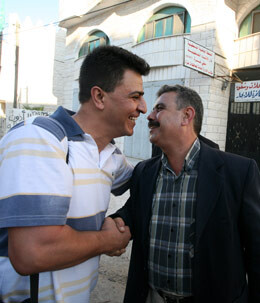The Electronic Intifada 16 November 2008

Fatah members in the Gaza Strip celebrate their release from a Hamas-run prison on 30 October 2008. (Wissam Nassar/MaanImages)
Hamas, which controls the Gaza strip, demanded their release as a precondition for attending the talks which were due to take place in Cairo under Egyptian mediation.
Last week Hamas released 80 Fatah political prisoners from Gaza’s jails and demanded the PA reciprocate.
According to human rights organizations, the bitter political rivals continue to imprison, torture, persecute and abuse their political opponents as the power struggle for supremacy across the Gaza Strip and the West Bank intensifies. These are the two main Palestinian territories.
The PA, which controls the West Bank, has recently stepped up its sweeping arrest campaigns throughout the territory.
Human rights campaigners say the majority of Hamas detainees in the West Bank have no relationship to the military branch of the organization or its fundraising activities. The majority of arrests by both parties are politically motivated and have nothing to do with either security or crime, they added.
“In the last two months we have noticed a large-scale campaign in the West Bank to prosecute persons said to be from the Hamas movement,” said Shawan Jabarin of the Ramallah-based Palestinian human rights organization Al-Haq.
Raji Sourani, director of the internationally respected Gaza-based Palestinian Human Rights Centre (PHCR) said Hamas’s release of political prisoners was a step in the right direction, and urged the PA to follow suit.
“However, we remain concerned at Hamas’s control of the judiciary and legislature which prevents an impartial judicial system. The continued abuses by both sides also makes it that much harder for the Palestinian factions to establish common ground politically,” Sourani told IPS.
Al-Haq released their latest tri-monthly Monitoring and Documentation report at the end of September which listed the various forms of torture and abuse applied by both sides to Palestinian detainees belonging to opposing factions.
Jabarin said he estimated that between 20-30 percent of detainees on both sides had been subjected to severe beatings and tied up in painful positions.
“The use of torture and ill-treatment against detainees has clearly become a widespread trend,” the report stated. It further said that in many cases court orders to release detainees were ignored by the intelligence services.
In both territories, authorities frequently failed to bring detainees before a prosecutor within the 24 hours required by law. Lawyers have also faced difficulty accessing their clients, and authorities frequently failed to inform detainees of the reason for their arrest.
Journalists associated with the opposition have also been targeted, and many are now afraid to voice dissent.
New York-based Human Rights Watch (HRW) released a report in July titled “Occupied Palestinian Territories: New Arrests Highlight Abuses by Hamas, Fatah.” Senior researcher Fred Abrahams says that the use of torture has since increased.
A number of detainees have died both in Gaza and the West Bank.
Dr. Ali Khashan, PA minister for justice, said his ministry was trying to improve the situation by reinforcing the police and building up a budget to help protect witnesses, the judiciary and detainees.
“We established a committee to monitor the violation of human rights and have intervened in a number of cases where we disagreed with the judiciary,” Khishan told IPS.
A Palestinian committee established by human rights groups and parliamentarians to monitor political detentions never got off the ground. It had the blessing of Abbas, but the security services which he controls refused to cooperate.
Hamas spokesman Ghazi Hamad told IPS that “Hamas is doing all it can to protect civilians, including disarming large numbers of criminals and gunmen from rival clans, in addition to allowing human rights organizations access to prisoners.”
However, neither authority has prosecuted any of its force members for abuses that have included summary executions, maiming and torture.
According to the HRW report, “compounding the problem, the criminal justice systems in Gaza and the West Bank are deeply flawed.”
“In Gaza, after President Abbas ordered judges and other officials to boycott judicial bodies in June 2007, Hamas began appointing new prosecutors and judges, although it lacked the legal authority to do so, and many have inadequate experience,” the report says.
Punishing those responsible for attacking civilians is problematic due to the judicial system in Gaza being split between Hamas and the PA.
“Hamas sacked the previous attorney-general affiliated with the PA and appointed a new one. In response PA appointed judges and legislators are boycotting the courts,” Sourani told IPS.
Exacerbating the situation is the destruction visited on Palestinian security installations and criminal justice facilities by the Israelis.
The movement of Palestinian security forces is severely restricted by Israel, and permits are required to enter certain parts of the West Bank under Israeli control, which can take time.
Israel has also given its de facto blessing to the use of excessive force, and said the PA is obliged to carry this out under the Roadmap peace plan. Israeli domestic intelligence chief Yuval Diskin recently described security cooperation with the West Bank authorities as “excellent, especially in combating terrorism.” He spoke of the shutting down of 60 civil institutions connected to Hamas.
A further problem hampering the Palestinian authorities is the lack of independent oversight.
“With little investigative experience and no forensic facilities, security forces continue to rely on a confession-based system, which encourages the physical and psychological abuse of detainees,” the HRW report says.
All rights reserved, IPS - Inter Press Service (2008). Total or partial publication, retransmission or sale forbidden.





